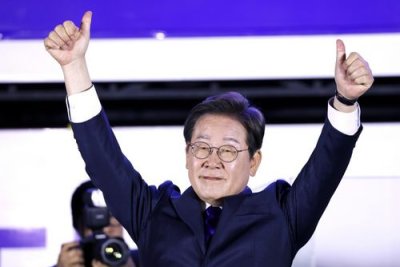
Democratic Party presidential candidate Lee Jae-myung celebrated at a campaign event in Seoul early Wednesday morning as he was on track to win the South Korean presidency in a landslide. Photo by Jeon Heon-kyun/EPA-EFE
SEOUL, June 4 (UPI) — Democratic Party candidate Lee Jae-myung was on track to win the South Korean presidential election by a landslide after almost all votes had been counted early Wednesday morning, bringing an end to months of political turmoil spurred by the botched martial law decree and impeachment of former President Yoon Suk Yeol.
Lee was leading his main opponent, Kim Moon-soo of the conservative People Power Party, by 48.44% to 42.59% with 90% of votes counted, according to the National Election Commission. By late Tuesday evening, local broadcasters KBS, MBC and SBS had projected a certain win for Lee in the snap election triggered by the ouster of Yoon.
In a speech near the National Assembly delivered at 1:15 a.m., Lee thanked his supporters and promised to accept the responsibility the voters have given him.
“I will not forget for a moment the mission you have expected and entrusted to me, and I will definitely fulfill it without fail,” he told a raucous crowd the Democratic Party estimated at 5,000 people.
Kim Moon-soo conceded shortly afterward at PPP headquarters in western Seoul.
Humbly accepting the results of the 21st presidential election, Kim said, “Nothing can take precedence over the will of the people.”
Some 35.24 million voters cast a ballot, representing a turnout of 79.4% — the highest mark since an 80.7% turnout in 1997. Excitement around the snap election was high, as many voters appeared eager to send a message of repudiation to the former Yoon regime and his People Power Party.
After voting ended at 8 p.m., ballot boxes from 14,295 polling stations nationwide were transferred to 254 counting stations. Some 70,000 poll workers will be counting throughout the night before officially certifying the result.
Lee’s inauguration will be held on Wednesday, without the typical two-month transition period due to Yoon’s removal from office in April.
He will face a host of challenges almost immediately, including an economic downturn and tariff negotiations with U.S. President Donald Trump, who last week announced plans to double tariffs on steel and aluminum to 50%. The presidential vacuum over the past several months has made it difficult for South Korea, an export-driven country, to craft a trade package ahead of the July deadline for Trump’s 90-day pause on so-called “reciprocal” tariffs.
Geopolitical concerns, including an increasingly dangerous North Korea, and a looming demographic crisis caused by the world’s lowest birth rate are key issues facing South Korea.
On this election day, however, the mood for Lee’s supporters was a mix of jubilation and relief. Many described casting their votes as a part of an existential battle for South Korean democracy in the wake of Yoon’s shocking Dec. 3 martial law attempt.
Exactly six months after that attempt, Lee said his first duty was to “restore democracy.”
“The first mission you have entrusted to me is to overcome the insurrection and prevent another military coup that threatens the people with the guns and swords entrusted to them by the people,” Lee said in his speech.
He also pledged to revive the economy and work toward peace on the Korean Peninsula before ending with a call for unity after the deepest political turmoil the country has seen in decades.
“The responsibility of the president is to unite the people,” Lee said. “This temporary difficulty that we are experiencing can be overcome by the combined strength of our great citizens. Will you join hands with your neighbors with hope and confidence? Now is the time to do it.”